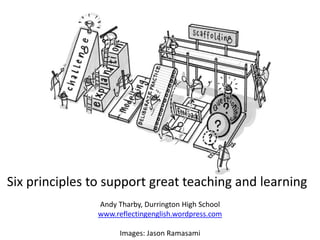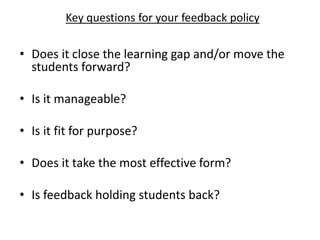This document outlines six principles of great teaching and learning:
1) Content knowledge - Teachers need strong knowledge of their subject and how students think about the content.
2) Quality of instruction - Effective questioning, reviewing previous learning, scaffolding new concepts, and using assessment improve learning.
3) Strategies with little impact - Praising low achievers, discovery learning, ability grouping, and focusing on motivation before content do not significantly help learning.
4) Differentiation and challenge - Teaching must be context-specific rather than following checklists, and challenge students long-term.
5) Explanations - They should connect to prior knowledge, consider cognitive limits, and make abstract ideas concrete.
6)























